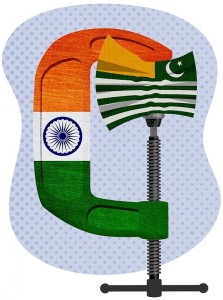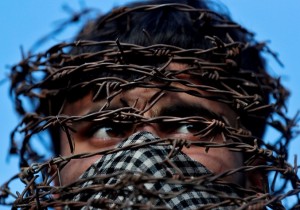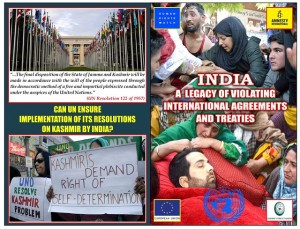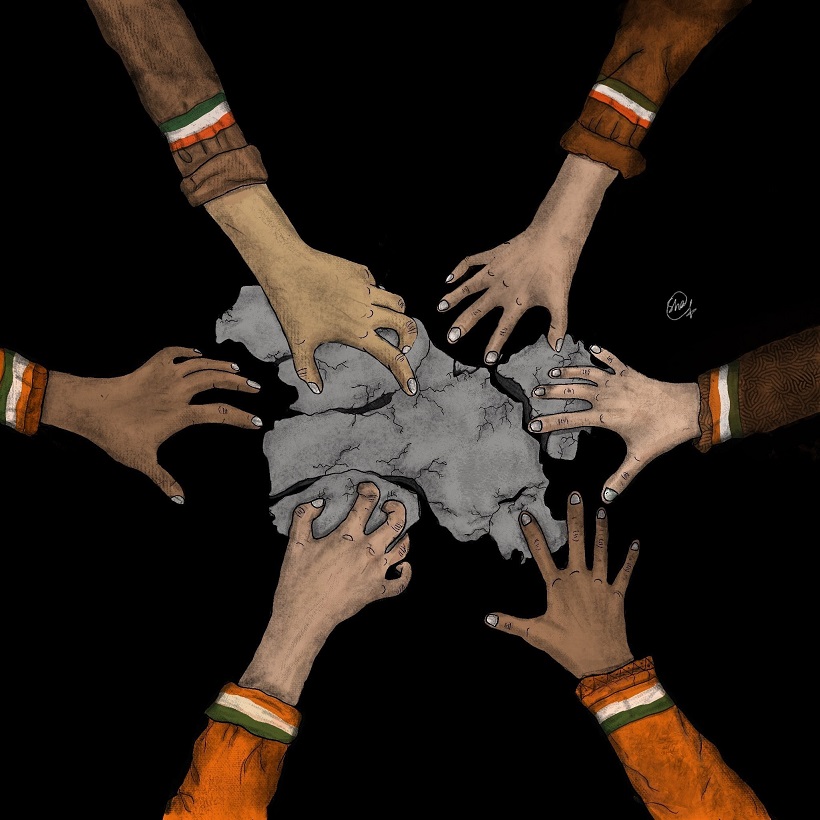DEMOGRAPHIC CHANGES IN KASHMIR
Last year, the Indian government introduced a new set of laws for Indian Illegally Occupied Jammu and Kashmir (IIOJK), including domicile rights for Indian citizens that will alter the demographic status of the Muslim-majority Himalayan region. The new domicile law is a result of a historical, political and policy myopia of India’s current dispensation, which has failed to understand the significance of the earlier permanent residency laws for different communities across IIOJK. Besides evoking fear of demographic change, it has raised concerns among Kashmiris regarding the loss of their economic and cultural rights.
There is a famous Machiavellian quote: “Whoever wishes to foresee the future, must consult the past.” While changes are being made to erase Kashmir’s history, it is important to learn from the history of people’s struggle for recognition of their very existential citizenry rights in the region.
In the year 1886, Dogra ruler, Maharaja Gulab Singh, ‘bought’ the state of Jammu and Kashmir for 75 million Nanak Shahi rupees (the currency of the Sikh kingdom at the time) from the British under the Treaty of Amritsar that was signed on March 16, 1846. The Dogra ruler Hari Singh was a monarch of Jammu and he owned the proprietorship of the valley hereditarily. Once Kashmir was purchased by the Dogra monarch, the proprietorship rights belonged to a Darbar consisting of closed relatives, courtiers and top officials (mostly Kashmiri Pandits). In the year 1947, Jammu was the first region to witness the most horrific episodes of violence during partition, in which thousands of Muslims were slaughtered and others were sent to West Punjab (later to form a part of Pakistan) by mobs and paramilitaries led by the army of then Dogra ruler. As per a report published in The Times, London on Aug. 10, 1948, as many as 2,37,000 Muslims were systematically exterminated unless they escaped to Pakistan.
Historians claim that the killings were carried out to change the demography in the region of Jammu as the Maharaja preferred to remain independent of the new dominions of India and Pakistan. This had been disputed by some of the Muslim groups in the Jammu region. At that time, Muslims constituted more than 60% of the population of the occupied valley. An effort to change the demography of the region by Maharaja Hari Singh ignited violence that became a perpetual source of conflict in the region. Demographic changes have often pushed regions and their people to the brink.
The new domicile law, which came into force last year, is another project aimed at creating homogeneity in the region, turning its residents – primarily Muslims – into a minority. It will further deepen the conflicts with demographic flooding of people based on scant documentary proof. The taking over of jobs, opportunities and resources from Kashmiris, and quashing their legal rights and privileges after years of people’s struggle for justice, rights and recognition in the region, is certain to make things worse.
The new law denies the historical significance of peoples’ efforts for rights, recognition and justice, and could end up alienating the Kashmiris further. The process of bringing the new domicile policy was shrouded in secrecy without involving consultations with relevant stakeholders. There is angst among the critics and residents, who have compared the new domicile law with settlements in the Israeli-occupied West Bank. As per a recent report by the Indo-Pak Conflict Monitor, the reading down of Article 370 has emboldened the longstanding conflict in the region and the situation of Kashmir’s security has gradually worsened, raising a question mark over the Indian government’s non-consultative and hard-line Kashmir policy.
On August 5, 2019, India’s Hindu nationalist government led by Prime Minister Narendra Modi stripped disputed Kashmir of its semi-autonomous powers. In addition to cleaving Jammu & Kashmir into two federally-controlled territories, and splitting off the thinly populated, Buddhist-dominated region of Ladakh, for the first time, people from outside Kashmir were granted rights to buy land in the valley. Before the Modi administration scrapped Article 370, outsiders were not allowed to buy land or property in IIOJK. A 1927 law, which was promulgated by the king of Jammu and Kashmir and subsequently continued through Article 35A of the Indian Constitution, denied outsiders the right to own property in Jammu and Kashmir. It also stripped a Kashmiri woman of the right to property if she married a person from outside the state. This law was brought in to protect the demographic identity of Jammu and Kashmir.
However, as part of scrapping Article 370, India also annulled the long-held hereditary special rights Kashmiris had over the disputed region’s land ownership and jobs. Under the new domicile law, authorities have begun issuing “domicile certificates” to Indians and non-residents, entitling them to residency rights and government jobs. Kashmiris view the move as the beginning of settler colonialism aimed at engineering a demographic change by relocating more Hindus to the region. The law makes it possible for any Indian national, who has lived in the region for at least 15 years or has studied for seven years and taken certain exams, to become a permanent resident of IIOJK. A growing number of outsiders are expected to qualify for domicile status in the future.
The new law has become a source of great anxiety for resident Kashmiris who fear that it is geared to bring about a demographic change through settlements of Hindu zealots. The new domicile law permits all those who have lived in occupied Jammu and Kashmir for 15 years or studied there for seven years to apply for a domicile. To make it more convenient, the Indian government has also been lenient with those who appeared in class 10th or 12th examinations in Kashmir; they may also avail themselves of this opportunity. To get any government job in the disputed territory, it is mandatory that the applicant have a local domicile. So, with this controversial step, the Indian government is not only planning to permanently settle the outsiders in Kashmir but also allowing them to get government jobs and register businesses there. In this manner, the local people will be deprived of jobs that should only belong to them.
Some 290,000 Indians from elsewhere have already been granted domicile certificates with the help of an online portal. At least 450,000 Kashmiris have lost their jobs. The Indian government is ensuring the process is fast-tracked and has introduced a fine of $670 (50,000 Indian rupees) to be deducted from the salary of any official in the territory who delays the process.
With these developments, Modi’s unbridled government wants Israel settlers’ style demographic change in the IIOJK. Work has already begun on altering the Muslim demographics in the region by separating Ladakh from Jammu and Kashmir and, in turn, carving out India’s Buddhist majority union territory. Following the abrogation of the special status of Kashmir and the enactment of the new domicile law, India has moved to transmute IIOJK from a bilateral usurpation of a people and their territory against their will.
It has happened at a time when the occupation of Kashmir is not accepted by the international community and there are multiple UN resolutions that forbid India from taking any such action to annex Kashmir or change its status in any way. Moreover, Article 49 of the 4th Geneva Convention states: “The Occupying Power shall not deport or transfer parts of its own population into the territory it occupies.” It further says: “Individual or mass forcible transfers, as well as deportation of protected persons from occupied territory to the territory of Occupying Power or to that of any other country, occupied or not, are prohibited, regardless of their motives.”
The same applies to the demographic composition that needs to be preserved to safeguard the interests of the Kashmiri people. Even according to the constitution of India and the universally accepted principle of constitutional proprietary, the government of India is both legally and morally bound to desist from using powers under a controversial and impugned Act. The Indian government should immediately stop exercising powers to promulgate domicile law and the rules in question. The people of Kashmir have already been greatly alienated, and the gap between Kashmiris’ aspirations and Indian attempts to annex is wide enough to prompt international action in this regard. No disempowering of local people should be allowed anywhere in the world.
We, the Pakistanis, express complete solidarity with the people of IIOJK. and assure our Kashmiri brothers and sisters that the Government and people of Pakistan remain shoulder-to-shoulder with them. Pakistan will not concede in its support until the Kashmiris realize their legitimate right to self-determination in harmony with the United Nations Security Council resolutions.
The writer is a PhD Scholar (English Literature).
He can be reached at: hbz77@yahoo.com
 Jahangir's World Times First Comprehensive Magazine for students/teachers of competitive exams and general readers as well.
Jahangir's World Times First Comprehensive Magazine for students/teachers of competitive exams and general readers as well.



